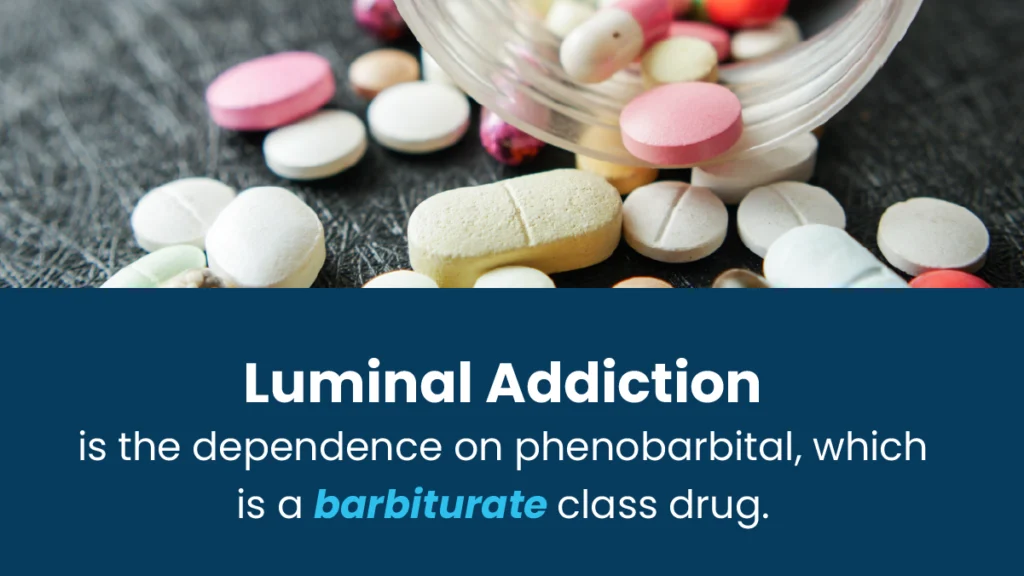Luminal Addiction: An Overview
Luminal addiction is a significant concern in substance abuse and involves the misuse of a luminal medication. It is known for its sedative and anticonvulsant properties. Despite its potency, it is also known for its addictive nature.
Understanding luminal misuse is paramount for recognizing, addressing, and preventing this form of substance abuse. Read on to explore the types and symptoms of luminal addiction alongside the array of treatment and prevention strategies for managing this condition.
Key Takeaways
Luminal addiction is a complex dependency on phenobarbital, demanding careful treatment and support for recovery. Here’s what you need to know:
- The biological basis of luminal addiction involves alterations in neurotransmitter activity and reward pathways.
- The various types of luminal addiction manifest through distinct signs, each indicating the complex nature of dependency.
- Addressing luminal addiction demands multifaceted strategies, integrating medical interventions and tailored therapies.
The Haven Detox-New Jersey offers many services to help you overcome luminal addiction. Call us at (856) 565-3102 to learn about our services.

Definition And Overview Of Luminal Addiction
Luminal addiction refers to the dependence on the drug luminal, also known as phenobarbital. This drug belongs to the class of drugs known as barbiturates, which are used to treat seizures and anxiety disorders and affect the central nervous system. Overdose or long-term use of luminal can lead to physical and psychological dependence.
Luminal addiction can significantly impact a person’s everyday life. Those addicted may find it difficult to function without drug use, affecting their daily activities and relationships. Additionally, obtaining and using the drug may become a central focus, overshadowing other essential aspects of life.
Individuals with luminal or phenobarbital addiction may experience withdrawal syndrome if they stop taking the drug abruptly. These symptoms include anxiety, tremors, and even seizures. It’s essential to manage this drug addiction under medical supervision to avoid severe health issues.
Biological Basis Of Luminal Addiction
Luminal addiction occurs when the body depends on a drug called luminal. This addiction affects the brain’s chemistry and functioning. It creates changes in how the brain communicates and responds. Understanding these changes helps explain why stopping the drug can be difficult.
Neurotransmitters are chemicals that send messages in the brain. In luminal addiction, these chemicals become imbalanced. This imbalance affects mood, behavior, and thought processes. Correcting this imbalance is vital to overcoming addiction.
Genetics can influence the likelihood of developing luminal addiction. Some people have genes that make them more prone to addiction. These genetic factors affect how their brains respond to drugs. Knowing your family history can help assess addiction risk.
Certain brain areas are vital in luminal addiction. The reward system, including the nucleus accumbens, plays a significant role. These regions control pleasure, motivation, and habit formation. Changes here make quitting luminal challenging.
Types Of Luminal Addiction
Luminal addiction can be classified into two main types. These include substance-based luminal addiction and behavioral luminal addiction. Both types have unique characteristics and serious side effects on patients. Understanding these types helps in recognizing and treating different addiction forms effectively.
Substance-Based Luminal Addiction
Substance-based luminal addiction involves dependency on illegal drugs, opioids, and alcohol. Individuals develop a physical and psychological need for these substances. Withdrawal symptoms occur when they stop using them. This type of addiction often requires medical intervention for treatment.
Behavioral Luminal Addiction
Behavioral luminal addiction includes addictions to activities like gambling or video gaming. People become obsessed with these activities, neglecting other life aspects. They experience similar cravings and withdrawal symptoms as those with substance use disorders. Treatment usually involves therapy and lifestyle changes.
Signs And Symptoms Of Luminal Addiction
Luminal addiction may develop without notice, accompanied by vital signs and symptoms of various health problems that necessitate recognition and intervention. Here are some common signs and symptoms:
- Panic Attacks: Sudden bouts of intense fear or anxiety, often recurring unpredictably, may signal luminal addiction.
- Suicidal Thoughts: Persistent thoughts or ideation of self-harm can indicate a severe psychological and physical dependence on luminal.
- Dizziness: Frequent bouts of lightheadedness or vertigo may point to luminal abuse, primarily upon standing.
- Altered Heart Rate: Irregular heartbeats or palpitations could result from luminal’s impact on cardiovascular function.
- Changes in Brain Activity: Cognitive impairment or confusion may arise due to luminal’s influence on brain chemistry.
- Respiratory Depression: Shallow breathing or slowed respiration is a dangerous consequence of luminal use.
- Mood Swings: Drastic shifts in emotions, from euphoria to depression, are familiar with luminal dependency.
- Habit-Forming Behavior: Developing a compulsive need for luminal, despite harmful consequences, indicates drug abuse.
Understanding and recognizing these signs of luminal addiction is pivotal for seeking help and embarking on the path to recovery from luminal addiction.
Treatment And Management Of Luminal Addiction
Treatment of luminal addiction involves medical professionals providing high doses of prescription medication to manage this medical condition. In the United States, healthcare providers offer various treatment options, including luminal detox or medical help for extreme cases. Effective treatment often requires understanding the patient’s medical history and medicine tolerance.
It includes procedures medical professionals perform, such as the medical detox or administering medications in emergency departments. In extreme cases, doctors may recommend intensive outpatient or partial hospitalization programs for medical care. These interventions aim to address the physical aspects of the condition and alleviate symptoms.
This involves therapies like cognitive behavioral therapy conducted by mental health professionals. Group therapy sessions provide support and strategies for coping with the condition. Medical staff may recommend these therapies alongside prescription drugs to address the psychological aspects of the condition and promote overall well-being.
They offer additional resources and support outside medical settings. They provide a supportive environment for individuals to share experiences and learn from others facing similar challenges. These programs complement medical and psychological treatments by fostering community and providing ongoing support beyond formal treatment sessions.
Prevention Strategies For Luminal Addiction
In the United States, preventing luminal addiction involves various strategies. Educational programs are vital in raising awareness among youth about the risks associated with luminal use. These programs provide information on the dangers of addiction and promote healthy lifestyle choices. Educating people empowers them to make informed decisions and resist peer pressure.
Policy and legislation are essential tools in preventing luminal addiction. Through regulations on drug manufacturing, distribution, and sales, policymakers can limit access to luminal and other addictive substances. By enforcing laws that control the availability of luminal, authorities can reduce its misuse and prevent addiction.
Early intervention approaches are vital in addressing luminal addiction before it escalates. Healthcare providers can identify individuals at higher risk through screening and offer timely interventions such as counseling and support services. By addressing underlying issues, they can enhance the effectiveness of early intervention strategies in combating luminal addiction.
Frequently Asked Questions (FAQs)
Luminal is a medication prescribed for treating seizures or epilepsy. It works by calming excessive electrical activity in the brain, which helps to prevent seizures. Doctors may also use it to manage certain types of anxiety or sleep disorders.
Luminal belongs to a class of drugs called barbiturates. It’s typically taken orally in the form of tablets or liquid. To avoid potential side effects or complications, it is crucial to take luminal precisely as a healthcare provider directs. Always consult a doctor before starting or stopping any medication regimen.
Luminal, a medication used to treat seizures, is not discontinued. It remains available for those who need it. People rely on luminals to manage their epilepsy. The drug helps control abnormal electrical activity in the brain. Its continued availability ensures patients can maintain their treatment plans.
Luminal’s effectiveness in seizure management persists, offering relief to those affected. So, if prescribed by a doctor, luminal is still a good option for seizure control. Its presence in the market reassures patients and healthcare providers. Thus, luminal is available for those who need its benefits.
Phenobarbital, used to control seizures, can cause several long-term side effects. It may lead to memory problems and trouble concentrating. Mood changes like depression or irritability are common. Long-term use can weaken bones, causing osteoporosis or fractures.
There’s also a risk of liver damage, especially with higher doses. Dependence on the drug can develop, making it hard to stop. Regular medical check-ups are essential to monitor these side effects and ensure safe use. Always consult your doctor if you notice any changes in your health while taking phenobarbital.
Rediscover Hope At The Haven Detox-New Jersey
Are you or a loved one struggling with the challenges of luminal addiction? Take a courageous step towards recovery with The Haven Detox-New Jersey.
At our facility, we provide a comprehensive detox program where your body undergoes a safe and supervised cleanse from harmful substances. Our residential rehab is designed to help you change how you think, feel, and react to triggers through multiple therapeutic opportunities, recreation, relaxation, and 24-hour support.
We also offer essential nutrient replenishment through NAD IV therapy, supporting your body’s recovery with vital vitamins and nutrients.
Our compassionate team is here to guide you through every stage of your journey. Call us today at (856) 565-3102 and start your path to healing.

